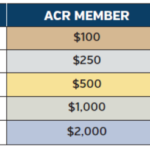As physicians, we play an important role in the well-being of patients and serve as advocates to ensure our patient receives adequate healthcare services. Unfortunately, many of the policy decisions that govern our medical practices are made by bureaucrats with inadequate input from physicians. Certain constraints placed on the way we should practice medicine have collectively hindered our progress as rheumatologists, thereby making it difficult to provide optimal clinical care—our promise to patients when we first take the Hippocratic oath.
There is an ever-growing, but largely unmet need for physicians to be social activists to ensure patients receive the services they need. Although many of us understand the importance of advocacy as a core principle in our clinical practice, our time is consumed by direct medical care, making less time available for advocacy efforts to bring social, political and economic changes to improve healthcare. One advocacy forum that helps us get in touch with people who matter the most in policy making and that serves as a bridge between rheumatologist and patients is the ACR’s Political Action Committee, also known as RheumPAC.
As a practicing rheumatologist, I have often been tormented by healthcare legislation that governs the way I should practice. Often, I am forced to provide medical care as dictated by insurance policies rather than doing what I know—by using my clinical judgment—is best for my patients. Due to insurance constraints, I have often spent long hours on the phone to obtain prior authorization rather than spending more quality time with patient care. This situation has left me frustrated. I am left with two choices: To stay quiet and suffer through the ignominy of being unable to help my patients and peers, or to stand up and make my voice heard.
I can very proudly say that I choose the latter. I have been associated with RheumPAC since 2016.
Serving on the committee reminds me of a quote by anthropologist Margaret Mead: “Never doubt that a small but thoughtful group of committed citizens can change the world; indeed, it is only thing that ever has.”
Serving on this committee has opened my eyes to the many obstacles we face in our daily clinical practice. The various trips we have made to Congress have helped me understand the fundamentals of health advocacy, the legislative process and how to be an advocate at the local, state and federal levels. As a core group, we concentrate on identifying the various problems encountered in our daily clinical practice, creating solutions using effective strategies and acting to bring positive changes.
During one advocacy visit to Congress, I had the chance to meet Rep. Pete Sessions (R-TX 32nd District [until Jan. 3, 2019]), who has always been a champion for healthcare reforms. Rep. Sessions made time in his busy schedule to spend with our group. The various topics discussed included putting patient care first by changing the policy of step therapy, also known as fail first, which forces rheumatologists to use therapies preferred by insurance companies rather than conventional wisdom and medical judgment, thereby delaying medical care and putting patient health at unnecessary risk. The need to streamline the prior authorization process was also discussed.
Millions of Americans, including children, suffer from arthritis and do not have access to specialist care due to rheumatology workforce shortages. Thus, we discussed how Congress can support policies to help expand the rheumatology workforce and manage this need. Increasing financial support for rheumatology fellowships and an expedited process for foreign physicians to work in the U.S. under the H-1B visa program would help tackle this shortage.
Reimbursement is on the decline, and this has affected our practice. We discussed ways Congress can help, such as with public service loan forgiveness. This is one viable option to help new rheumatologists pay off loans or reduce total loan payments.
The lack of adequate investment in medical research is also a concern. The good news: Collaborative efforts of the various rheumatology committees and Congress led to the approval of millions of dollars in research funding for arthritis.
During our entire interaction, Rep. Sessions showed a keen interest in being our liaison, taking our message to Congress and educating members on the various issues affecting rheumatologists and the barriers we must overcome to provide quality service to our patient population. It is very important that we build more bridges in places that matter the most, such as Congress, to establish a healthcare policy that works for both rheumatology professionals and patients.
I would strongly recommend every rheumatologist associate themselves with RheumPAC by volunteering and providing generous donations. For more information about RheumPAC, click here.
Disclaimer: Contributions to RheumPAC are used for political purposes and are not tax deductible. They must be voluntary and made with personal funds. Federal law prohibits contributions to RheumPAC from corporations, but ask us about the RheumPAC Advocacy Fund, which does support advocacy with soft dollars. Contributions to RheumPAC can only be made by U.S, citizens or permanent resident aliens.
Padmapriya Sivaraman, MD, is a board-certified rheumatologist and internist who joined Rheumatology Associates, North Richland Hills, Texas, in March 2016. She earned her undergraduate degree at Kasturba Medical College, Manipal University, India. She completed both her residency and rheumatology fellowship at Case Western Reserve University, Cleveland, where she then held a position on the rheumatology faculty.
